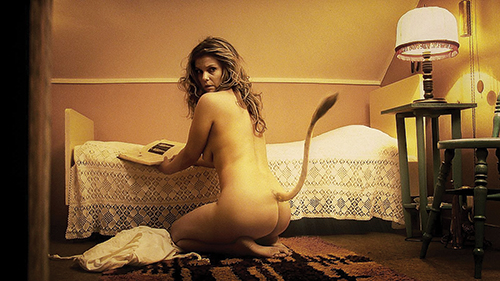
Over the last few years, Scandinavia has established itself as a powerhouse when it comes to cinema that blends suspense, horror and creatures of native lore. Most notably, Sweden contributed Let the Right One In, which dabbles in vampires, and Norway Trollhunter, which features under-the-bridge-dwellers.
This weekend, the Northwest Film Center will showcase Norway’s latest addition to the Scandinavian fantasy/suspense genre: Thale (pronounced “thaw-lay”), named after the film’s mystery creature, a Norwegian wood nymph or “huldra.”
The film focuses on two men—Elvis and Leo—who work as crime-scene janitors. This is the context in which we meet them: cleaning up the body and home of a man who lived in the middle of a forest with nothing but expired canned food and a bathtub full of milky, opaque white water.
In their exploration of the depths of this cabin, Elvis discovers Thale, a beautiful, nude young woman who is both dangerous and skittish, putting Fatal Attraction’s Sharon Stone to shame for showing only what’s under her skirt. When her past is revealed, we learn that Thale was something of a daughter and an experiment to the old man who had lived there.
The film is less conflict-oriented than the standard Hollywood movie being churned out every three weeks. It’s more of a documentary that deals with the few hours that these two men interact with this beautiful and mysterious creature.
With a running time of only 76 minutes, Thale establishes and showcases exactly what it needs to, when it needs to.
One of the most unique and admirable traits of this movie is its naturalistic style, regardless of the fact that one of the three main characters is a wood nymph. The characters are only ever seen in the basement of the cabin or in the woods just outside.
In the scenes shot outside, the weather is very similar to that of springtime Portland: overcast, the sky a dull gray tone. Not only does this make for excellent contrast and emphasis of colors, but, speaking as a native Northwesterner, it also makes the scenery feel more relatable.
When our heroes aren’t enjoying the views of the forest or lake, they’re inside the cabin, which is usually lit by subtle green and yellow hues. The film takes on a murky, shadowy feel, as if we’re only seeing what the director wants us to see, with everything else shrouded in mystery.
The lighting isn’t the only shrouded aspect of the film, however. The actress who plays Thale, Silje Reinamo, doesn’t utter a word the entire film. Her wide brown eyes, however, make for perfect windows into Thale’s mind.
We see her distress, confusion, anger and comfort through her eyes, as well as just how quickly and abruptly she transitions from one emotion to the other.
We see multiple sides of Thale, and we get to experience her reintroduction to the world and to her natural environment. It’s a natural growth and transition that’s interesting and engaging to watch and encourages the audience to empathize with her throughout the story.
It’s apparent that the same effort was not put into fleshing out Elvis and Leo, however, and this is my biggest and my only complaint about this movie.
At different times, it’s said that there are personal problems in both of the characters’ lives: One is having difficulties with his family, the other with his health.
Thale
Friday, April 5, and Saturday, April 6, at 8:45 p.m.
Whitsell Auditorium
1219 SW Park Ave.
$9 general admission, $8 students
These problems contribute very little, if anything, to the story and to the plot, and certainly do not contribute to the emotional value of those characters to the audience.
The writers’ blatant revelation of these problems—basically, their pleas for sympathy for these characters—are almost insulting to the viewer. Thankfully, these “developments” play a small role in the film.
One of my favorite things about Thale is its realism. The camera is handheld for the majority of the film, the lighting is either natural or earthy yellow and green, the setting is a forest far from civilization, and nature and evolution are recurring themes and plot drivers.
Thale is an independent film that doesn’t attempt to hide that fact. It took three years to make and was written, directed and edited by Aleksander Nordaas. He combined nature, realism and fantasy to create a dark and enigmatic film that can only be found outside of Hollywood and inside such places as the Northwest Film Center.

